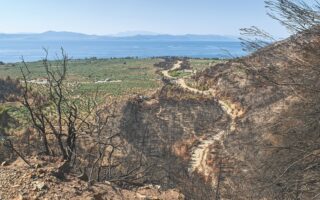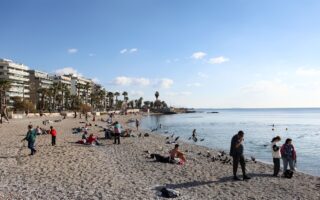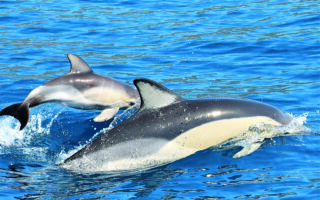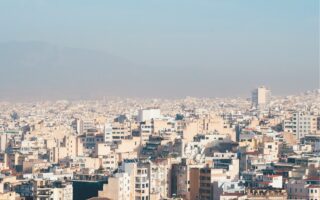Greece: Calling all young climate champions
Among others, Ecogenia is a civic initiative in the country that aims to train and mobilize youths in action projects to save the environment
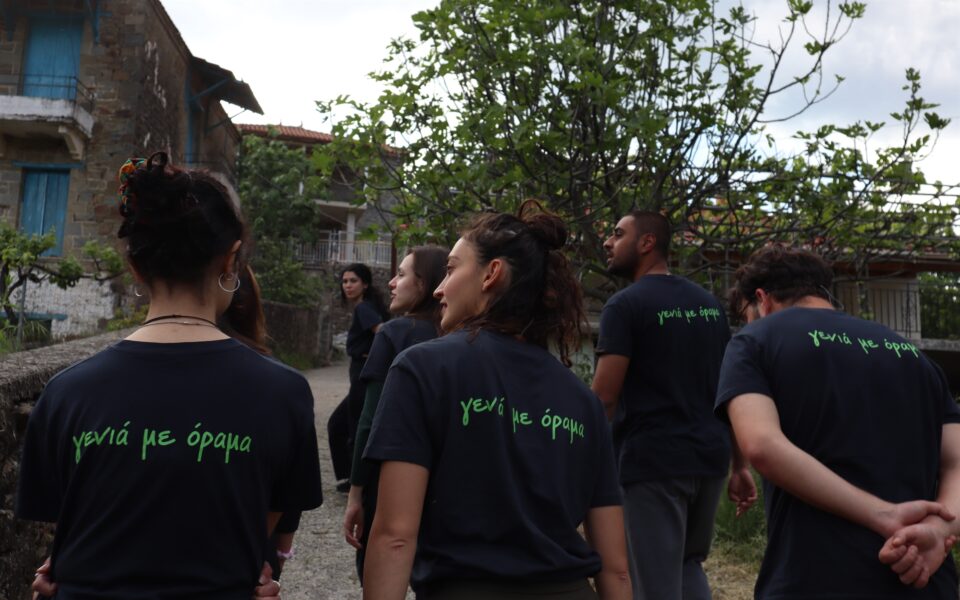
Challenges can often present extraordinary opportunities, even when those challenges seem insurmountable. The climate crisis is the biggest existential threat to date, and the weight of the responsibility, and risk, sits on the shoulders of younger generations.
In Greece, this weight is particularly heavy, as the youth are faced with economic uncertainty and climate anxiety. They understand the dependence on a thriving, growing tourism industry, which is an important driver of the economy that provides jobs. They also understand that the climate crisis could threaten that industry, which is also a source of pride for the country. According to some estimates, Greece could expect more than a million travelers from the United States alone in 2023 because of more direct flights to Athens.
The attraction to Greece is not a surprise. It has it all in terms of natural resources. The sun, which provides 250 days of sunshine per year, seas, rivers, lakes and mountains, not to mention history and archaeological sites, make it a top tourist destination year after year. The country is well-positioned to harness its natural resources and put them to work, making for a sustainable future that paves the way for forms of ecotourism that could be the envy of the world.
This aspiration will not be without consequence to the preservation of cultural heritage and the environment, presenting a hard choice between sustaining one of the main economic lifelines of the country, which impacts the young workforce that rely on seasonal work, while protecting the places that feed this same industry. It can be done, though.
It was Costa Rica in Central America that first brought the concept forward in the 1960s to preserve and protect its natural resources while inviting the world to come and enjoy the beauty of the country, to celebrate it, by also helping to protect it. That was the plan and it worked.
Greece is already making great strides of its own. According to Reuters, which reported on Greece’s first climate law passed last year, “legislation set interim targets for Greece to cut greenhouse emissions by at least 55% by 2030 and by 80% by 2040 before achieving zero-net emissions by 2050.”
A high-profile New York Times article from 2021 laid out the goals for Greece and its progress: The island of Naxos, via an undersea web of cables, is facilitating wind power. Other islands are operating as incubators for electric cars. Solar panels and wind turbines are beginning to dot the mainland and many of the 227 inhabited islands (and counting). Big corporations with deep pockets see the potential and are investing.
But it will not only be well-endowed corporations and wealthy outsiders that make the difference or even the biggest difference. Greece needs to exploit, by participation, its most precious natural resource of all: its young people.
It is a common assumption to think that young people don’t care or don’t get it or are too immersed in their virtual worlds, electronic devices, and frivolous interests to care. Quite the contrary.
Look no further than one Lefteris Arapakis of Enaleia. He has invited young people to help him clean up the otherwise pristine Greek waters by inviting fishermen, whose catches are less than they used to be, to fish also for old, abandoned nets that litter the sea bottom. Win-win-win. The sea beds are cleaned up to preserve and protect sea life. Fishermen are making money when there’s no catch. And young people are engaged by doing something that is meaningful.
There is Vassilis Sfakianopoulos of Save Your Hood. He, one person, decided to do something about his neighborhood in Athens, to collect garbage and waste of all kinds, to recycle it, to show pride in where he lives by beautifying it. And this leader in community mobilization and garbage and waste collection now has a young following in his own neighborhood. Further, he has invited other neighborhoods and leaders to do the same. Save Your Hood is now a network of neighborhoods filled with young people who feel empowered to act all over the city of Athens where they live. And he has introduced his concept to communities in other parts of the world.
And there is Ecogenia – an organization with a goal that is bold, to become Greece’s national climate corps. It is recruiting, training and mobilizing eager young people in climate action projects across the country. The ambition is to scale this work and accelerate the local and national climate agenda, while empowering a green workforce.
Ecogenia has the attention not only of Greece, but also of the European Union. It was selected to represent Greek civil society in the Forum of the Mediterranean and it was also selected as the national winner for the coveted European Youth Charlemagne Prize. Ecogenia is a model for the empowerment of young people, in this case young Greeks who care deeply about their country and its future, and to channel that passion via the climate crisis.
While Greece has many good qualities, one of them has not been, until very recently, fostering a culture of volunteerism over time
Through a term of civic service, Ecogenia cohort members are able to contribute in a very practical way towards climate action, by serving a local community while also getting compensated for their time. Ecogenia cohort members have expressed that an added benefit of their service term is coming together to work on teams with like-minded people in solidarity with one another to proactively combat their own climate anxiety. This sense of common purpose and solidarity is critical to keeping young people inspired and motivated in a world that oftentimes feels overwhelming and difficult to navigate.
Ecogenia’s pilot projects have focused on two main program areas so far; ecotourism and education. Their ecotourism work in Dorida, Central Greece mobilizes young people to open and maintain a system of hiking trails that connect villages in the region. Their education work in Hania, Crete trained cohort members to work with young students, engaging over 500 of them in education and activities that build awareness, also promoting the practice of civic engagement.
Ecogenia is also creating synergy between other groups that are also fighting against our warming climate. There is no quick fix or one solution to the crisis we are in, and collaboration is at the center of this work to ensure that an all-hands-on-deck approach is fully realized.
One of the organizations it has partnered with is The American College of Greece (ACG) through two of its organizational units: The Demos Center, the mission of which is to shape active, effective citizenship through a specialized study abroad program and year-round programming including panels and film screenings focused on the environment. Also, The Center of Excellence in Sustainability with its emphasis on academic offerings, research and other initiatives. Demos and the CoES will work with Ecogenia on developing programming which promotes sustainability to strengthen Greek society while Ecogenia recruits students from ACG’s Environmental Studies program and Department of Science and Mathematics. It’s a win-win for both the students at ACG and Ecogenia’s efforts as it expands both programming and participation.
While all seems very promising and there is momentum, Greece itself and its young activists also are facing a challenge of their own. While Greece has many good qualities, one of them has not been, until very recently, fostering a culture of volunteerism over time. As a result, many young people feel undervalued or not valued at all in their work.
Other developed countries in Europe have an infrastructure and a culture which supports the dedication of young people in this work, and also happens to feed their passion about the future. Greece lacks both and it hurts those young people who take their lives, their work as activists, and their identity as Greeks, seriously.
One young Greek had worked in another more privileged European country in climate activism. She compared the experience to taking care of a relative’s fairly healthy child, while neglecting their own sick child, the one who needed her more, back home. She felt guilty about doing it. But the reality for many young Greeks is that their country simply doesn’t love them back, at least not enough to invite them to work with serious stakeholders in the country to create an agenda, together, for sustainable development.
One thing is certain: Young Greeks love their country. They want to be seen and heard. And they want to be a part of a successful future, because they believe that they have an important role to play. A part of the latter is to bring even more people into their tent.
Ecogenia, while still a budding organization, aspires to become a national program, which will ask every young Greek to serve its country in the war on climate change. They will get rewarded twice. Service is often its own reward. It breeds pride and generates energy to do more. And financial compensation is an incentive, showing that their work has value, and guarantees that this opportunity is accessible to all. Win-win.
Ecogenia and other organizations that work in cleaning up the environment will help to create a Greece with more opportunity in the near future. Together with the government, and private investors all working on climate together, this can put a plug in Greece’s brain drain, which has been handicapping the country since the 2008 financial crisis and subsequent bailout. Climate activism, and attention to the climate crisis by investors, creates jobs to which Greeks will come home if they pay well. And Greeks who have been forced to work in other countries by virtue of the lack of opportunity in Greece want to come back home.
There is only one way to change things in a country, any country, and that is for people to get involved. Civic engagement is key. The best way to preserve democracy and help it flourish is to take part in it. Active, effective citizenship is essential, and so the best chance we have to combat climate change is for every citizen to roll up their sleeves and get involved. Win-win-win.
Now is the chance to join the next Ecogenia team and become part of the generation with a clear vision to prioritize climate action. Ecogenia is currently recruiting for its next cohort. If you are 18-30 years old, or know any young people in that age group, looking for a paid opportunity to get involved in climate action, now is the time to apply. This next group will work in the region of Dorida to continue opening and revitalizing a network of trails to help kickstart a local ecotourism economy. In addition to this meaningful community-based work, cohort members will receive customized training during their term, and after the program, they will become activated in a growing Ecogenia alumni network.
Applications are due March 13, 2023 and the program will run from May 2 to July 7, 2023. Log on to ecogenia.org/dorida-recruitment/.
Dr Mary Cardaras is a journalist and associate professor and chair of political science at California State University, East Bay. She is the director of The Demos Center at The American College of Greece and serves as president of the Friends of Ecogenia. To reach her about Ecogenia or The Demos Center: [email protected].


